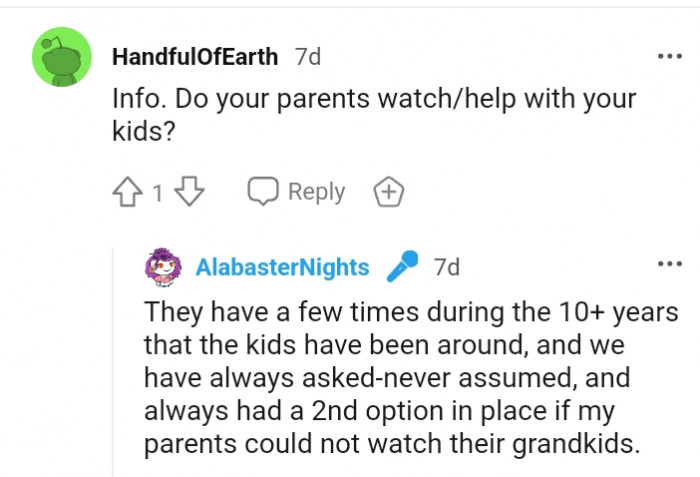Silent Treatment Follows After Redditor Refused To Take Care Of Parents' Dog For The Long Weekend
We all want the best for our animal family members. Every pet owner cares deeply that their animal companions have all the care and supplies they require to live happy and healthy lives as pets.
To maintain your dog’s health and happiness, you must be knowledgeable about basic dog maintenance and how to attend to its demands. Luckily, it’s not too difficult to provide your dog with all of these items.
In fact, knowing how to care for a dog is crucial before adding one to your home. You must meet both its physical and emotional requirements.
This entails giving them access to wholesome food, good nutrition, preventive veterinary care, health monitoring, grooming, a place to call home, plenty of exercise, and love. It also involves ensuring the dog is content by providing it with ample opportunities to play, exercise, and stimulate its mind.
There are times when we have to be somewhere and cannot take our dogs with us, so we find a good dog sitter to handle the job. However, the OP’s parents thought they could bypass that option and just dump their dog on the OP because they were going to a wedding that the OP couldn’t attend.
Mind you, the OP is married and has two kids, so he has commitments, which is why he couldn’t attend the wedding. Read all that transpired as you keep scrolling below.
OP asks:

My partner and I are very busy with our family

You can watch the dog for us while we are gone

The Impact of Silent Treatment
The silent treatment, often a form of emotional manipulation, can significantly impact relationships and mental health. Dr. Ramani Durvasula, a clinical psychologist, states, "The silent treatment can create a profound sense of isolation and rejection, leading to diminished self-worth." Individuals subjected to this behavior may experience stress akin to physical pain, as emotional and physical pain pathways in the brain overlap. As highlighted on her professional website, understanding these dynamics is crucial for cultivating healthier communication strategies in relationships. For more insights, visit Dr. Ramani Durvasula's website.
Behavioral psychologists advocate for the practice of gratitude as a countermeasure to resentment. Studies indicate that expressing gratitude can shift focus from negative feelings to positive aspects of relationships. Regularly acknowledging partners' contributions can foster a more supportive environment, reducing the likelihood of conflicts escalating into silent treatment. Couples can implement gratitude practices, such as sharing daily appreciations, which can enhance relationship satisfaction and emotional connection over time.
Understanding Family Responsibilities
This situation highlights the challenges that arise when family members have differing expectations regarding shared responsibilities.
Research in family psychology indicates that clear communication about responsibilities is essential for reducing conflict.
When expectations are misaligned, it can lead to feelings of resentment and frustration among family members.
Here is what Redditors had to say...
1. My dog is my baby and my responsibility

2. No obligation at all

3. Run with the silent treatment

According to Dr. John Gottman, a renowned relationship expert, the silent treatment is considered one of the 'Four Horsemen' that predict relationship breakdown. His research underscores that withdrawing from communication often leads to resentment and a lack of emotional connection. Instead of resorting to the silent treatment, couples can benefit from practicing open dialogue about their feelings, which fosters understanding and promotes emotional intimacy. This approach encourages a healthier resolution of conflicts and strengthens the bond between partners.
The couple's reluctance to care for a family pet may reflect deeper issues related to boundaries and personal priorities.
Studies show that individuals often have varying levels of commitment to family obligations, which can create tension in relationships.
4. They want the dog, so they should look after it

5. Their dog is not your responsibility

6. We have always asked, not assumed

Emotional Regulation and Conflict
Psychologists emphasize the importance of emotional regulation in managing conflict effectively. The inability to communicate feelings can lead to misunderstandings and prolonged resentment. Research from the National Institutes of Health suggests that individuals who cultivate emotional intelligence can better navigate challenging conversations without resorting to avoidance tactics like the silent treatment. Tools like mindfulness and reflective listening can enhance emotional regulation, leading to healthier interpersonal dynamics.
The Importance of Open Communication
This scenario emphasizes the importance of open communication in family dynamics, particularly regarding shared responsibilities.
According to research in conflict resolution, discussing expectations openly can lead to better understanding and cooperation among family members.
When everyone feels heard, it fosters a sense of belonging and teamwork.
7. The OP should have spoken up sooner

8. This dog child is not going with them?

9. Does it matter that your mother is pouting?

Studies in social psychology reveal that perceived social support plays a vital role in mitigating stress from relational conflicts. When individuals feel supported, they are more likely to engage in constructive discussions rather than withdrawing. A clinical psychologist points out that fostering an environment of mutual support can significantly reduce the likelihood of resorting to the silent treatment. Practicing active listening and validating each other's feelings can create a more nurturing atmosphere for resolving conflicts.
To navigate disagreements over family responsibilities, families may benefit from setting up regular family meetings to discuss concerns and expectations.
According to studies in family therapy, regular check-ins can help maintain harmony and ensure that all members feel included in decision-making.
Creating a culture of respect and understanding can enhance family dynamics.
10. Enjoy the break that comes with the silence

11. My parents don't get people to watch their dogs

12. You just have to stand up to them

The Role of Boundaries
Establishing healthy boundaries is crucial in any relationship, especially when feeling overwhelmed by obligations. According to Dr. Alexandra Solomon, a relationship therapist, "Setting boundaries is an act of self-care and respect for both yourself and others." Research supports that individuals who articulate their limits tend to experience higher levels of satisfaction in their relationships. A study highlighted by Dr. Tal Ben-Shahar, a happiness researcher, indicates that boundary-setting can lead to decreased anxiety and improved well-being. Couples should openly discuss their needs, ensuring that both partners feel heard and valued, which can prevent feelings of resentment.
Addressing Emotional Responses to Responsibilities
This situation also reflects the emotional responses individuals may have toward family obligations, particularly when they feel overwhelmed.
Research indicates that perceived unfairness can lead to resentment and conflict within families.
Recognizing and addressing these emotional responses is crucial for maintaining healthy relationships.
13. Not just having a dog, you need to plan around it too

14. What this Redditor would tell them after they sit down

15. You have your own life and kids

Dr. Brené Brown, a well-known researcher on vulnerability, emphasizes the importance of courage in communication. She argues that vulnerability, including expressing discomfort or dissatisfaction, is essential for nurturing deep connections. Encouraging partners to share their emotions openly can help dismantle the cycle of silent treatment. Brown's work demonstrates that vulnerability fosters trust, which is fundamental for resolving conflicts and fortifying relationships. This approach ultimately creates a safe space for both partners to express their needs.
Ultimately, fostering a culture of respect and understanding in family dynamics requires commitment from all members.
As highlighted in family psychology literature, creating a safe space for discussing feelings and responsibilities can significantly enhance family cohesion.
16. It's not your responsibility to take care of a dog that's not yours

17. If I help, I do it because I want to

18. You are definitely not your parent's servant

The Psychology of Resentment
Resentment often stems from unmet expectations and a lack of communication. When individuals feel their needs are consistently disregarded, it can lead to emotional withdrawal and behaviors like the silent treatment. Research shows that understanding the root causes of resentment is vital for healing. A clinical psychologist recommends the use of journaling to identify and articulate feelings, which can help individuals address underlying issues. This self-awareness can pave the way for more constructive communication and resolution in relationships.
19. The dog deserves a vacation too

20. Your mother is acting like a petulant child

Dog ownership is a serious commitment that should not be entered into lightly. It certainly takes more than just filling the pet’s water bowl, walking the dog, and cleaning the litter box to properly care for a pet.
So it’s understandable that the OP’s parents chose a family member to look after their pet, but then again, they got it all wrong by assuming things would go their way.
Psychological Analysis
This situation illustrates common challenges in family dynamics, particularly regarding shared responsibilities.
From a psychological perspective, addressing these issues requires open dialogue and a commitment to understanding each family member's perspective to foster cooperation and harmony.
Analysis generated by AI
Analysis & Alternative Approaches
This situation underscores the importance of communication and understanding in navigating family responsibilities.
Research supports the notion that fostering open dialogue and mutual respect can significantly improve family dynamics.
Moving Forward: Actionable Steps
Understanding the dynamics of the silent treatment and its psychological implications is crucial for fostering healthier relationships. As research underscores, open communication and emotional regulation are essential in resolving conflicts and preventing misunderstandings. Implementing strategies like boundary-setting, expressing gratitude, and practicing vulnerability can significantly enhance relational quality. Ultimately, cultivating a supportive environment where both partners feel valued and heard is vital for long-term relationship satisfaction and emotional well-being.



